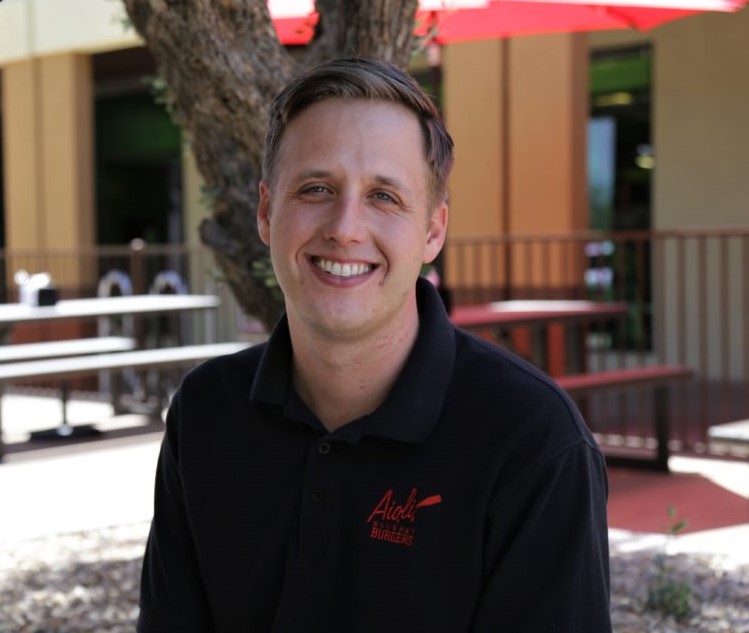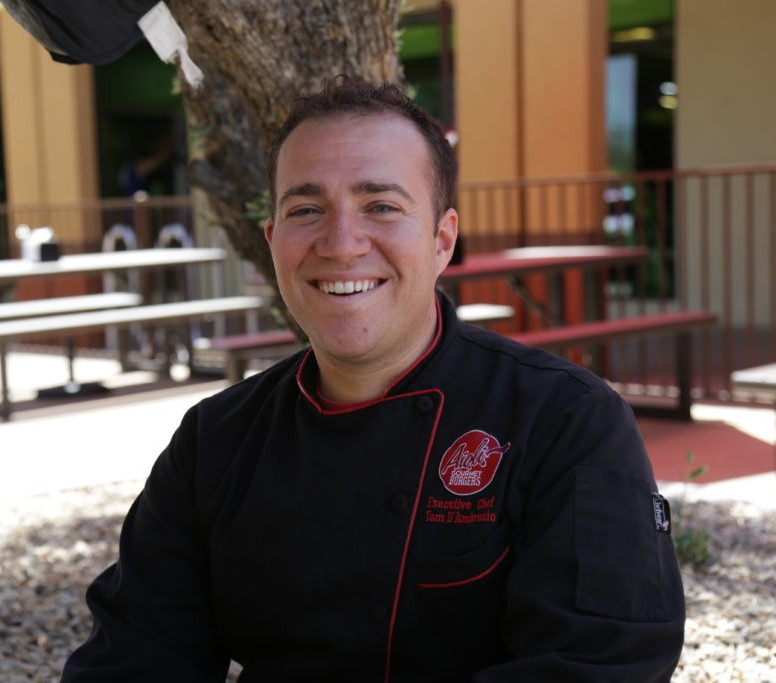Article
Aioli’s consulting — from food truck basics to foodservice expansion
While their motivation for launching the consulting business last year was partly financial, partners Kyle Hollenbeck and Tom D'Ambrosio also wanted to help improve the overall professionalism and reputation of their industry.

February 27, 2019 by Elliot Maras — Editor, Kiosk Marketplace & Vending Times
Aioli Gourmet Burgers & Catering's fast growth in Phoenix naturally attracted the attention of other food truck entrepreneurs.
 |
| Kyle Hollenbeck assists newbies in evaluating food truck events. |
In the seven years the gourmet burger business grew from one truck to seven trucks and a restaurant, as described in part one of this two-part series, food truck owners have asked partners Kyle Hollenbeck and Tom D'Ambrosio for advice.
"We were always helping people," D'Ambrosio said.
Food truck owners asked them for help with everything from menu planning to strategizing for expansion.
Recognizing a need
The more they gave advice, the more people wanted it. They realized there was a strong need for food truck education, so in the last several months, they introduced a food truck consulting business. And while their motivation for launching the consulting business was partly financial, they also wanted to help improve the overall professionalism and reputation of their industry.
 |
| Tom D'Ambrosio helps new operators plan their menus. |
The area they get the most requests for is menu planning — specifically having the right items and having them priced properly, Hollenbeck said. D'Ambrosio, a professionally trained chef and the winner of several culinary competitions, helps new operators plan their menus. This often includes providing an understanding of how to cross-utilize ingredients for different menu items. D'Ambrosio also assists operators with cost-effective food purchasing strategies.
Hollenbeck, who has a background in sales and customer service, assists newbies in evaluating the profit potential for food truck events, as well as website design and social media. He also advises them on how to prepare for health department inspections.
There are a lot of nuances food truck owners need to be aware of to be successful, Hollenbeck said, even those operators with foodservice experience.
"It (a food truck) is not like a kitchen in a restaurant where they (the employees) can say whatever they want in the back; the customers can hear you on a food truck," Hollenbeck said.
Advice for newbies
Before taking on a client for consultation, Hollenbeck and D'Ambrosio tell them they have to understand the time and financial commitment the food truck will require.
"You can't be an accountant 40 hours a week and do this (food truck) on the weekend," Hollenbeck said. "If you do it the right way, it is a lot of work."
Naturally, many newbies are seeking advice, with basic questions such as how much to invest in a truck.
The partners tell newbies to expect to spend $25,000 to $30,000 for their truck, and have an additional $20,000 to cover the other costs.
They also advise them that it makes better sense when starting out to buy a used truck instead of a new one.
"Buying new can be really tough," Hollenbeck said, not just referring to the truck itself, but the appliances. A new truck with appliances can easily cost $80,000.
"That's where a lot of people fail," Hollenbeck said.
Help with expansion
More experienced food truck owners often need help with expansion. Many food truck owners aspire to open a restaurant, but making that leap successfully takes planning. Hollenbeck and D'Ambrosio help owners decide on whether they should open a brick-and-mortar restaurant, and what factors to consider in selecting a location should they decide to make the investment.
Finding the right location for a brick-and-mortar restaurant can take a lot of time, the partners said. In their case, the right location was a building with a kitchen and parking area that allowed them to support their food trucks.
In many cases, food truck owners close their food trucks when they open a restaurant, which Hollenbeck and D'Ambrosio consider a mistake. They have found the two businesses support one another. Restaurant customers who have never seen the food truck want to know where to find it, and vice versa.
"You can continue to run both," Hollenbeck said.
Consulting offered based on client need
The partners offer an introductory two-hour consulting session, for which they charge $200 to $300. In many instances, this session is all the food truck owner needs. They also provide monthly conference calls.
The partners currently have four regular monthly clients, for which they spend about 15 to 20 hours a month, and they could accommodate another 20 hours.
In the course of consulting, they often connect clients with their knowledge partners, such as their bookkeeper, their food truck builder and repair people.
"It's not just us," Hollenbeck said.
They have mostly gotten clients through word of mouth.
When their consulting business reaches 60 hours a month, the partners will consider allocating additional resources to it. They enjoy the consulting and see it as a growth area.
"We really just help them get it all going," Hollenbeck said.
Photos courtesy of Aioli Gourmet Burgers & Catering.
About Elliot Maras
Elliot Maras is the editor of Kiosk Marketplace and Vending Times. He brings three decades covering unattended retail and commercial foodservice.
 ChatGPT
ChatGPT Grok
Grok Perplexity
Perplexity Claude
Claude





